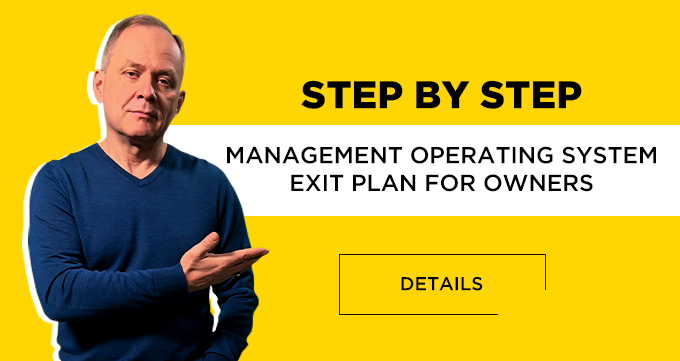What Makes a Good CEO: Qualities, Functions, and Control
A CEO is more than just a manager. They are your right hand, the executor of strategy, and the point of accountability for results. It is entirely up to them whether your business becomes a well-oiled system or remains perpetually reliant on manual intervention. If you make the wrong choice, the cost of that mistake is measured not only in money but also in lost years.
According to McKinsey, companies can lose up to 30% of their annual profit due to a weak management team. The reason isn't bad ideas, but rather people who are unable to execute them. This is especially evident in small and medium-sized businesses, where the director often becomes the bottleneck for growth.
I've worked with business owners for over 20 years, and I know for a fact: a good director isn't just a competent manager. They're someone who can lead a team, take responsibility, and stay the course.
Key Qualities of a CEO
- Ability to Work with People A CEO without a love for people is like a navigator afraid to speak with the crew. They might be excellent with spreadsheets, plans, and numbers, but if they aren't interested in their employees, they won't build a team. And without a team, no business processes will work. McKinsey estimates that up to 30% of profits are lost due to ineffective management.
In the early 2000s, I worked with a leader who automated everything – from communication to meetings. The company was orderly, but there was no drive. The result was high employee turnover and stagnation. A strong leader engages; they don't just assign tasks, they lead.
To assess this quality, simply analyze how the person communicates: Do they inspire your trust? Can they maintain a lively dialogue? Do they have an emotional connection with people? - Has Their Own Achievements A strong director is someone who can achieve results themselves. I always ask three questions: "What have you achieved? What did you do to achieve it? And what difficulties did you face?" If the answers sound perfect, it means the person either doesn't remember reality or is embellishing.
Amazon's experience shows that leadership roles are filled not based on diplomas, but on the ability to handle uncertainty.
A good candidate isn't afraid to talk about difficulties. They'll explain how they acted when there was no easy solution, and I consider this the main indicator of maturity. - Willingness to Work Closely with the Owner Sometimes I encounter directors who build a parallel reality. They don't listen to the owner, they act on their own, and then they're surprised by conflicts. This is dangerous.
The CEO must accept the direction from the owner. They shouldn't argue with the goal, but rather implement it. Otherwise, the company will start to lose its sense of purpose, and the owner will burn out. In my team, no top manager becomes a "second owner." They know: I set the course, tasks are set based on strategy, not personal ambitions. This is the only way to maintain control. - Communicates Clearly and Concisely Complex terms, convoluted phrasing, endless abstractions – that's not intelligence, it's a defense mechanism against specificity. The team shouldn't have to decipher the director's words. A good leader speaks directly. They can explain the essence of a task so that any employee understands it. This isn't simplification – it's an indicator of internal clarity. Such people don't waste energy on overcomplication. They just get things done.
CEO Responsibilities: What Must Be Documented
Even the most talented person will be ineffective without structure. The CEO's functions must be clearly defined. Moreover, they should be regularly reviewed, at least once every 3-5 years.
Standard list:
- Management of key processes
- Responsibility for finances and assets
- Signing contracts on behalf of the company
- Approval of schedules, regulations, organizational structure
- Issuing orders, internal instructions, and hiring
- Implementing motivation and disciplinary systems
- Controlling accounting
- Delegating authority in case of temporary absence
In large companies, such as Procter & Gamble, every management function is documented. This is precisely why they scale without losing quality.
Should You Control the CEO?
Yes. Not because they might "fail." But because they are the executor, not the strategist. Their area of responsibility is execution, while you set the direction. Control over the CEO is not a lack of trust, but a management tool.
I recommend:
- Weekly meetings on key tasks
- Prioritization alignment
- Analysis of deviations from goals
- Participation in an advisory board with department heads
The board isn't just for show. It's a working tool that helps the director gather feedback, build a cohesive plan, and convey it to the owner.
Conclusion
When choosing a CEO, evaluate them not by their words, but by their behavior. The main indicators:
- They love people and know how to work with them.
- They have personal, confirmed results.
- They are willing to adhere to the owner's strategy.
- They communicate clearly and concretely.
A good director is a point of support, not a point of tension. If they are systematic, predictable, and capable of achieving goals, you'll be able to breathe a sigh of relief and focus on business development.
If you're looking for a CEO or another leader for your company, visit https://go.bbooster.online/eor8 to get a checklist and assess the effectiveness of your current hiring and onboarding processes. This will help you identify weaknesses, improve hiring quality, and reduce employee turnover.

